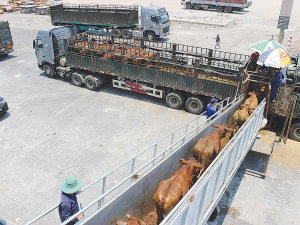Farmers back ‘gold standard’ regulations for livestock exports
Federated Farmers want to see the return of cattle exports but insists that animal welfare and New Zealand’s international reputation must be protected first.
 Live Animal Export New Zealand says claims banning live exports is out of step with the views of the New Zealand public.
Live Animal Export New Zealand says claims banning live exports is out of step with the views of the New Zealand public.
The organisation that represents live exporters believes a more highly regulated industry would have been a better approach than a complete ban.
Live Animal Export New Zealand (LENZ) says banning live animal exports will damage the New Zealand economy and claims the move is out of step with the views of the New Zealand public, according to research it has carried out.
"According to an independent research report by science insights company Voconiq, over half of New Zealanders surveyed have confidence that regulation can hold the industry accountable," LENZ spokesman Mark Willis says.
He adds that the industry's call for a Gold Standard of care for live animal exports in NZ has been ignored by the Government.
"Two years ago, our industry banded together to propose that the Government introduce much higher standards of care for the animals exported from New Zealand. We set out a clear and evidence-based 12-point regulatory plan to Minister O'Connor that would further improve and modernise the live animal export system," Willis says. "We did not receive any response."
LENZ accuses the Government of failing to consult in good faith with industry. "The end result will be legislation that is detrimental to the livelihood of farmers and New Zealand's economy, and a missed opportunity to lift the standards of live animal exports globally."
An independent report, prepared for Alliance farmer shareholders is backing the proposed $250 million joint venture investment by Irish company Dawn Meats Group.
Whangarei field service technician, Bryce Dickson has cemented his place in John Deere’s history, becoming the first ever person to win an award for the third time at the annual Australian and New Zealand Technician of the Year Awards, announced at a gala dinner in Brisbane last night.
NZPork has appointed Auckland-based Paul Bucknell as its new chair.
The Government claims to have delivered on its election promise to protect productive farmland from emissions trading scheme (ETS) but red meat farmers aren’t happy.
Foot and Mouth Disease outbreaks could have a detrimental impact on any country's rural sector, as seen in the United Kingdom's 2000 outbreak that saw the compulsory slaughter of over six million animals.
The Ministry for the Environment is joining as a national award sponsor in the Ballance Farm Environment Awards (BFEA from next year).

OPINION: For years, the ironically named Dr Mike Joy has used his position at Victoria University to wage an activist-style…
OPINION: A mate of yours truly has had an absolute gutsful of the activist group SAFE.